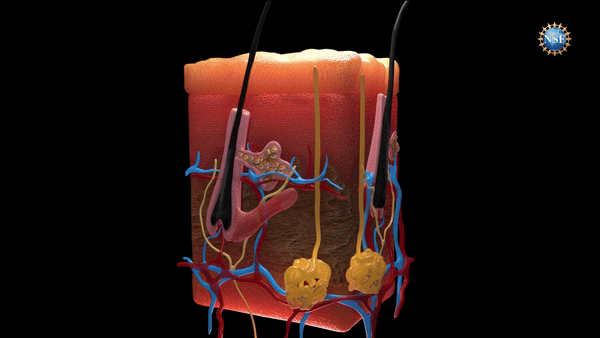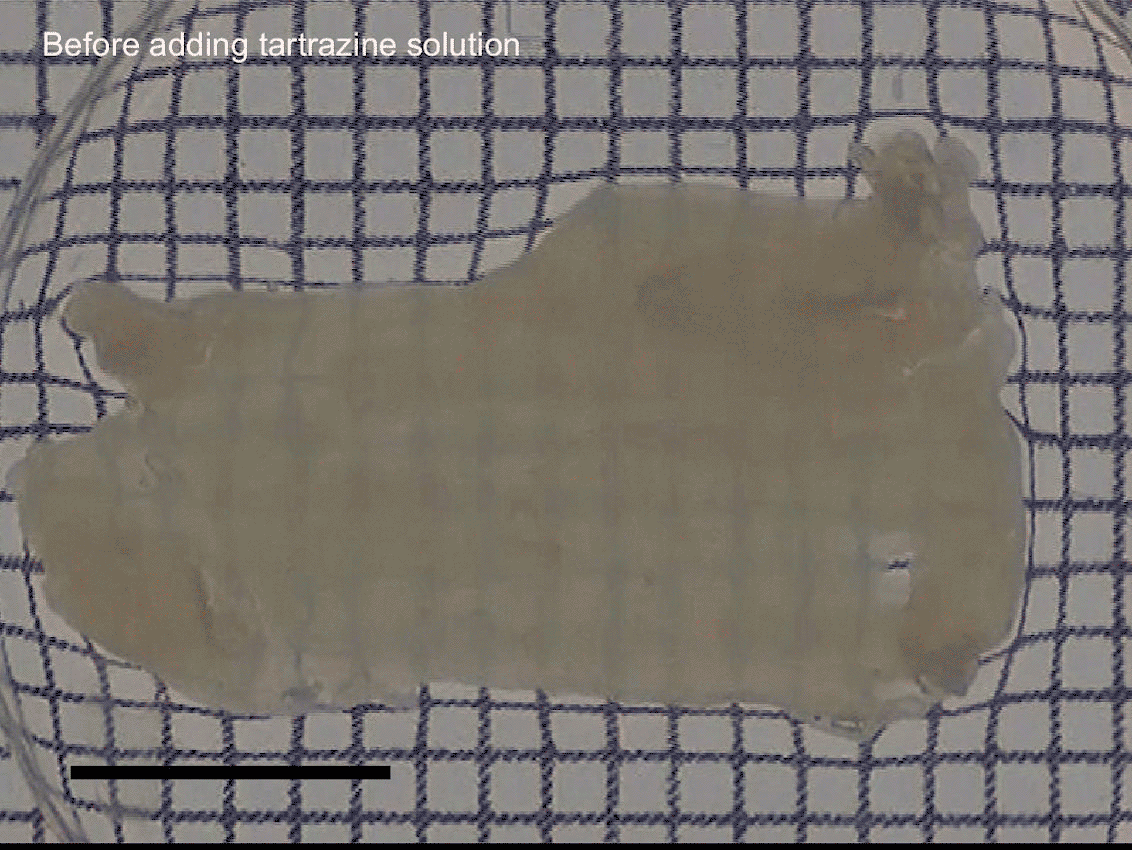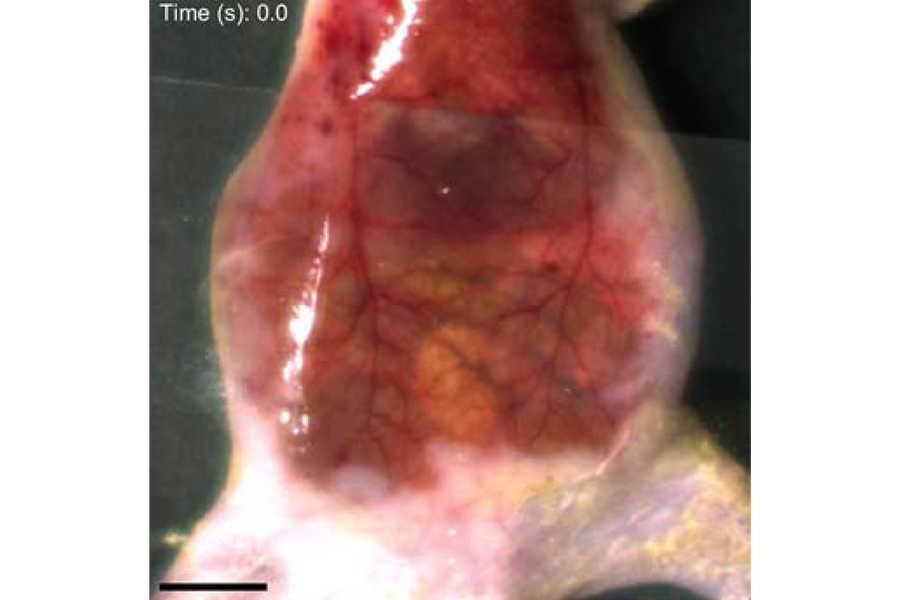September 5, 2024
5 min read
Scientists Make Living Mice’s Skin Transparent with Simple Food Dye
New research harnessed the highly absorbent dye tartrazine, used as the common food coloring Yellow No. 5, to turn tissues in living mice clear—temporarily revealing organs and vessels inside the animals

Skin normally scatters light, a phenomenon represented by white lines in the beginning of this clip. When the food, drug and cosmetic dye Yellow No. 5 is absorbed by skin, however, it reduces scattering and allows light to penetrate deeper, making the tissue transparent. (This technique has not been tested on humans. Dyes may be harmful. Always exercise caution with dyes and do not consume them directly, apply them to people or animals or otherwise misuse them.)
Keyi “Onyx” Li/U.S. National Science Foundation
In mere minutes, smearing mice with a common food dye can make a desired portion of their skin almost as transparent as glass.
In a study published today in Science, researchers spread a solution of the dye tartrazine, a common coloring for foods, drugs and cosmetics, onto living mice to turn their tissues clear—creating a temporary window that revealed organs, muscles and blood vessels in their body. The procedure—a new form of a technique known as “optical tissue clearing”—has not yet been tested in humans, but it may someday offer a way to view and monitor injuries or diseases without the need of specialized imaging equipment or invasive surgery.
“One unique part about our strategy is that we are changing the optical properties of the tissue directly,” says the study’s lead author Zihao Ou, a physicist at the University of Texas at Dallas.
On supporting science journalism
If you’re enjoying this article, consider supporting our award-winning journalism by subscribing. By purchasing a subscription you are helping to ensure the future of impactful stories about the discoveries and ideas shaping our world today.
Skin, like most mammalian tissue, is highly opaque because its mix of water and densely packed lipids, proteins and other essential molecules scatters light in all different directions. “The concept is similar to bubbled water,” Ou explains. “When you have water and air, both of them are transparent separately. However, if you mix them together, you form microbubbles that are no longer transparent.” Think of a rushing river or a crashing wave. The change in clarity comes because water and air molecules have different refractive indexes—the amount of light that bends passing through an object or substance. The fats and proteins in rodent and human skin typically have higher refractive indexes than the water, which creates a contrast that you can’t see through. In the new study, Ou and his colleagues looked for light-absorbing molecules that could make the various refractive indexes within the layers of skin more similar—essentially reducing the amount of light scattered throughout.

Photographs of “scattering phantoms,” or samples that mimic the optical distribution of human tissue, composed of agarose hydrogels. The phantoms contain increasing concentrations of tartrazine and the same concentration of silica particles. The scale bar represents five millimeters.
Guosong Hong/Stanford University
The team investigated 21 different synthetic dyes before landing on the highly absorbent tartrazine, more commonly known as Yellow No. 5. The zingy lemon-yellow coloring is approved by the Food and Drug Administration to be used in limited quantities in foods, drugs and cosmetics. It’s commonly found in chips, sodas, candies, butter, vitamins and drug tablets. Tartrazine makes the refractive indexes of molecules it encounters more uniform and lets through red and yellow light, similar to the color of underlying tissue. At the same time, the dye absorbs most light at wavelengths in the near-ultraviolet and blue spectrums and decreases the scattering of those types of light. “The higher the absorption, the more efficient the molecule is,” Ou explains. The FDA’s limits on chemicals and additives in foods causes the food industry to look “for chemicals that are extremely efficient,” even in small amounts.

Animated stills from a real-time imaging video show the dynamic process of a chicken breast tissue that transitions from opacity to transparency after immersion in a 0.6-molar solution of tartrazine (Yellow No. 5). The progression begins before the tartrazine solution’s application and then shows a range of 0.2 to 60 seconds after. The scale bar represents 5 mm.
Guosong Hong/Stanford University
The researchers tested various concentrations of the dye on “scattering phantoms” (square samples that mimic the optical distribution of human tissues) and slices of raw chicken breast. They then gently massaged the dye onto the skin of anesthetized mice, where it was absorbed like a “facial cream,” Ou says. In less than 10 minutes, the team began to see internal features beneath the top layers of tissue under visible light—rubbing tartrazine onto the animals’ stomach revealed the digestive tract in action, and spreading it onto one of their legs exposed muscles. Using high-resolution laser imaging, the scientists also saw details of nerves in the gastric system, small units in muscles called sarcomeres and, when the dye was applied to the mice’s scalp, even structures of the brain’s blood vessels. If the tartrazine wasn’t washed off, the effect lasted about 10 to 20 minutes before the skin returned to its original state.

A still image of a real-time video demonstrates the optical transparency in a mouse abdomen, enabling the visualization of the animal’s abdominal organs. The scale bar represents 5 mm.
“Achieving Optical Transparency in Live Animals with Absorbing Molecules,” by Zihao Ou et al., in Science, Vol. 385. Published online September 5, 2024
Past research that rendered skin transparent focused on introducing already transparent materials, including glycerol and fructose solution. Those molecules were also able to reduce light scattering but were “not as efficient [as tartrazine] because they are not ‘colored’ enough,” says Guosong Hong, a materials science engineer at Stanford University and senior author of the new paper. Other approaches that remove essential molecules in tissues rather than adding new ones accomplish similar effects but can only be done in nonliving animals or biopsied tissue. For example, Oregon Health & Science University dermatologist Rajan Kulkarni worked on an optical tissue clearing project in 2014 in which researchers completely dissolved the lipids from whole organs and animals and replaced them with clear hydrogel. “That was always a limitation, it required something to be ex vivo. We had to remove the tissues or remove the organ, or the organism itself was no longer living,” says Kulkarni, who was not involved in the new study. “This method [in the new paper] is interesting because it does allow the skin, or the epidermal layer, [in living animals] to be made transparent so that you can visualize what is underneath.”
While it is far from human trials, the concept may someday have helpful medical applications. Hong proposes it could potentially assist in the early detection of skin cancer and make laser-based tattoo removal more straightforward. It could also make veins more visible for drawing blood or administering fluids via a needle—especially in elderly patients with veins that would be difficult to locate—he says. In some cases, such a strategy may be a more compelling option than the use of imaging technologies such as magnetic resonance imaging (MRI) and ultrasound. “I can definitely see this could be useful for mouse and other kinds of animal visualizing experiments because it would give you the ability to visualize at light microscopy resolution, whereas other methods of MRI, CT [computed tomography], ultrasound are not as finely resolved,” Kulkarni says. “In terms of a proof of concept, it’s really fantastic. Clinically, it remains to be seen.”
The researchers didn’t observe any adverse side effects in the mice after the dye was removed. Ou says that tartrazine and similar, more efficient molecules must be further tested for human safety, however. Tartrazine can cause allergic reactions. And although the coloring is FDA-approved, the agency has strict limitations on amounts used in products. In the study, the mice were able to tolerate the highest concentration used, 0.6 molar, during the short testing periods. But “human skin is about 10 times thicker than [that of] mice, which means that the time required for diffusion is probably much greater—a few minutes for mice is going to be hundreds of minutes for humans,” Ou says. “We hope that with our initial work, there will be more follow up proposing new molecules that are going to be more efficient and safer for human application.”









